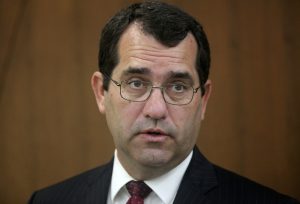Kansas Medicaid expansion push hasn’t cracked GOP roadblock

TOPEKA, Kan. (AP) — Democratic Gov. Laura Kelly and other advocates have ramped up a campaign for her proposal to expand Medicaid in Kansas after conservative lawmakers showed they currently hold enough power to block it.
Kelly held a news conference Thursday with four business leaders and kicked off a two-hour seminar on the potential economic benefits of expanding state health coverage for the needy. About two-dozen religious leaders also were at the Statehouse, partly to lobby for expansion, and supporters plan a March 19 rally.
The new Democratic governor is trying to crack Republican leaders’ hard opposition to Medicaid expansion as she seeks her first major victory in the GOP-dominated Legislature. Advocates believe they have bipartisan majorities for her proposal but are still trying to figure out how to get around Republican leaders.
“We’re seeing that there doesn’t seem to be a path forward right now,” said Moti Rieber, a Kansas City-area rabbi and executive director the clergy group lobbying Thursday. “I don’t know that we recognized the implacable opposition that was going to develop to the governor’s agenda.”
Kansas legislators hit the halfway point of their annual session last week. They are scheduled to take an extended spring break in April and wrap up in mid-May.
While the House’s health committee had “round-table” discussions on Medicaid expansion this week, there’s no indication any committee in either chamber plans to ever vote on a bill.
“Nothing has changed in Medicaid expansion: It’s a bad deal,” said House Majority Leader Dan Hawkins, a conservative Republican.
Three dozen states have expanded Medicaid or seen voters approve ballot initiatives for expansion, including Republican-led Idaho, Iowa, Nebraska and Ohio. The federal Affordable Care Act of 2010 encouraged expansion by promising states that the federal government would pick up the bulk of the extra cost.
Kelly, a former state senator, told reporters, “I’m anything but naive,” but added, “I’m confident we can get this done.”
Supporters argue Medicaid expansion is likely to be a net financial plus to the state, leveraging $1 billion or more a year in federal dollars to boost struggling rural hospitals and generate new health care jobs and tax revenues.
“The net cost to the state is modest for an enormous amount of good,” said GOP former state Senate President Dave Kerr.
Kansas resisted Medicaid expansion because former Republican Govs. Sam Brownback and Jeff Colyer and many GOP legislators were strong critics of the 2010 health care overhaul championed by former President Barack Obama, a Democrat.
Medicaid expansion supporters passed a bill in 2017 with large bipartisan majorities, only to see Brownback veto it.
Conservative Republicans argue that expanding Medicaid could saddle the state with unexpected and rising health coverage costs while greatly expanding government’s reach.
The nonprofit, nonpartisan Kansas Health Institute said this week that Kelly’s plan would provide Medicaid coverage for about 129,000 residents and nearly 55,000 of them would be adults and children switching from private insurance.
The institute projected a net cost to the state of $47 million for the first full year of expansion — 40 percent higher than the $34 million projected by Kelly’s administration.
“If they just want to cram it down people’s throats, it’s going to be a mistake and they’re going scream and holler when people have to get cut off from services because we’ve got a hole coming in our budget,” said Rep. Brenda Landwehr, a conservative Republican and chairwoman of the House health committee.
While Kelly’s proposal has the backing of the Kansas Hospital Association and local chambers of commerce, their support and advocates’ arguments don’t seem likely to sway the opponents holding key leadership jobs in the Legislature.
“Am I going to change? No,” Hawkins said.









